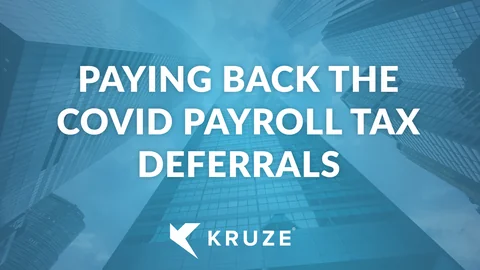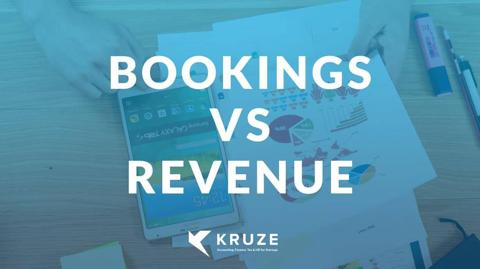
This article is about how to pay back CARES act payroll tax deferrals. The Coronavirus, Aid, Relief and Economic Security Act (CARES Act) let employers defer payment of the employer’s portion of the Social Security tax (see IRS Notice 2020-65) This was NOT free money like the PPP Loan; companies are required to back these deferred taxes.
So if you remember, take yourself back to March, April 2020. The federal government was doing everything they possibly could to help startups, small businesses survive COVID. It was a very scary time! And so one of the things they made available to startups and small businesses was the option to delay paying (or defer) the company’s portion of payroll tax payments. Since every business that has payroll is paying these, it was a way to try to help reduce the cash flow impact of keeping people employed.
And so the government was trying to do the right thing, they were making more cash available to startups that needed it. But, when our team looked at it, it wasn’t like a grant or a forgivable loan like PPP - it was a loan, you were basically deferring these payroll taxes. Companies had to pay back the IRS.
The schedule to pay them back was 50%, that was deferred in 2020, needs to be paid back in 2021 by the end of the year. And the other 50% had to be paid back by the end of the year 2022. So, it’s not bad, it was a loan, it was a zero-cost loan, not a bad thing to do.
However, there were reasons that we didn’t think was a great program for VC backed startups…
What happens to payroll tax deferrals if a startup goes out of business
Our concern at Kruze was, what happens if, heaven forbid, but a startup goes out of business or goes bankrupt. What happens when that company uses the payroll tax deferrals and then goes under? The IRS and the federal government want their money - and the company’s gone out of business. And so, our startup tax team was pretty cautious on encouraging companies to do this, because we didn’t want the government to come back after those founders’ personal money if the company had crashed. So that’s the context behind the payroll tax deferral. If your company used the payroll tax deferrals and now went out of business, you should consult your tax advisor asap. And as you are going under, you should work closely with your attorney and accountant to figure out how to make the IRS whole, as you don’t want them coming after the executives and directors of the company.
How to pay back the COVID payroll tax deferrals
It’s 2021, and it is time to start paying back the COVID payroll tax deferral loans. A lot of companies have been asking us, how do you do it? And this isn’t something handled by your payroll provider. While you may have chosen/elected to defer inside of your payroll provider dashboard, but, you can’t pay back the federal government from within the payroll providers’ dashboard (we asked the major startup payroll providers about this, and unfortunately they confirmed that they don’t have this functionality.)
You can visit the IRS’ website directly to see their instructions, but since so many of our clients are asking how to manage the payments we have written out more detail below.
There’s a system called EFTPS, which is like an electronic funds transfer network that the federal government has. You can access EFTPS here. And so you’re going to use that to pay the federal government. Now remember, you only have to pay 50% of it back in 2021 and 50% in 2022. So you’re going to log in, create an account, and you’re actually going to start sending them money. Now, some companies prefer to do this on a monthly basis, right, so that’s it’s not all hitting at the end of 2021. But other companies are preferring to just wait ‘til late in December and actually just make their 50% payment then. However you do it, it’s a good best practice to establish your account and actually know how it works and be able to fund it. You don’t want to be the people trying to pay this on December 31st, and not be able to figure your account and then not get the money in, and then have a big penalty. And don’t tell our friends at the IRS this, but the government’s software has been known to have technical issues as the deadlines approach as everyone tries to do everything all at the same time…
Some tips for paying back the Federal government
You’ve got to be really careful about this. Just remember, you can actually pay it before it’s due, so you don’t have to wait until December. There are companies that we work with, not that many took this, but some of the ones that we did, they’re just paying on a monthly basis.
Expect quarterly statements from the IRS for what you owe. We expect that they are going to do it on a quarterly basis, like Q1 2020, Q2 2020. And so you may get actually four statements in the mail saying “Hey.” This is if you deferred for all four quarters in 2020, you may get four statements, so just know.
When you do make payments, the IRS is going to apply those payments to the earliest deferral. So for example, say you make a bunch of payments now, until you fully pay back the 2021 obligation every payment is going to go against the 2021 obligation. Make sure you do the accounting in your head correctly, and you’re not thinking you’re paying back a portion of 2021, or 2020 evenly, it’s all going to go back to the 2020 allocation first, and then the 2021 obligation.
You can’t just send a check to the IRS to do this, and again, your payroll provider will not make this payment for you. Remember you do need to establish an account at EFTPS.gov. You need to do this, you need to go to that website, sign up, create an account, then follow their money transfer directions there.
The payroll tax deferral, in our opinion, was a good program, especially for small businesses that were less likely to go out of business, but for startups, we were always just worried it could get a little scary and we didn’t want someone’s personal financial future to be destroyed if the startup went down, so not too many Kruze clients actually used it. And it highlights why working with a unified accounting and tax partner like Kruze is a good idea - our accounting team can coordinate with our tax team and make sure this kind of compliance work is done right the first time.
But for those of you who did it, this is how you pay the federal government back. Hope that helps, thanks.
Unrelated to payroll tax deferrals is a different type of payroll tax credit that is only available to companies formed DURNING COVID. This credit is called the Employee Retention Credit or ERC. Learn about how Recovery Startups can get an ERC here.















